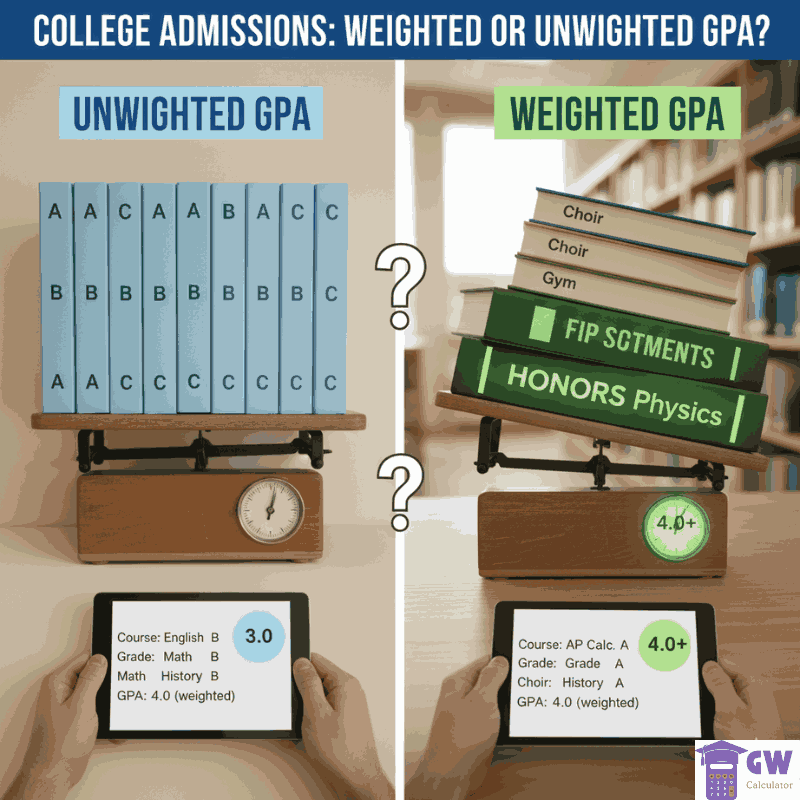Most colleges look at both weighted and unweighted GPAs to get a full picture of a student’s academic performance. Unweighted GPA shows your performance on a 4.0 scale without considering course difficulty, while weighted GPA accounts for honors, AP, or IB classes—often using a 5.0 scale. Selective universities tend to recalculate GPAs using their own methods, ensuring fair comparison among applicants.
1. Understanding Weighted vs. Unweighted GPA
Your GPA (Grade Point Average) is one of the most influential numbers in your academic journey — it summarizes years of effort into a single metric that colleges use to gauge your readiness, consistency, and academic strength. But here’s the catch: not all GPAs mean the same thing.
Schools report GPAs in two main formats — weighted and unweighted — and understanding the difference can help you know how your transcript will be read by admissions officers.
| Type | Scale | Includes Course Difficulty? | Example |
|---|---|---|---|
| Unweighted GPA | 0.0 – 4.0 | ❌ No | All A’s = 4.0 |
| Weighted GPA | 0.0 – 5.0 (sometimes up to 6.0) | ✅ Yes | A in AP English = 5.0 |
🔹 Unweighted GPA — The Standard Measure
An unweighted GPA is a pure average of your grades without considering how difficult your classes are. Every course — whether it’s regular English or AP Physics — carries the same value.
It’s useful for showing academic consistency, but it doesn’t reflect how challenging your coursework was.
Example:
If you earn straight A’s in all standard classes, your unweighted GPA will be 4.0.
If you earn B’s in all AP courses, your unweighted GPA drops to 3.0, even though your classes were tougher.
🔹 Weighted GPA — Rewarding Academic Rigor
A weighted GPA gives extra points for advanced coursework such as Honors, Advanced Placement (AP), International Baccalaureate (IB), or dual enrollment classes.
For example:
- An A in a regular class = 4.0
- An A in an Honors class = 4.5
- An A in an AP class = 5.0
Weighted GPAs allow students who take challenging classes to stand out and demonstrate readiness for university-level academics.
💡 Why Both Matter
- Unweighted GPA measures your academic performance baseline.
- Weighted GPA measures your effort and challenge level.
Together, they tell colleges not only how well you performed but also how hard you pushed yourself.
🎓 Try these GPA tools to calculate both:
2. Do Colleges Look at Weighted or Unweighted GPA?
This question — “Do colleges look at weighted or unweighted GPA?” — is one of the most common among high school students preparing for university. The truth is: colleges evaluate both types, but how much weight each carries depends on the institution.
🎓 What Most Universities Do
Most universities and colleges use both GPAs together to understand your academic profile more fairly.
- Unweighted GPA shows your raw performance in all subjects.
- Weighted GPA indicates course difficulty and rigor.
🏛️ How Different Colleges Evaluate GPAs
- Highly Selective Universities (like Harvard, Stanford, MIT, and Yale):
They often recalculate your GPA using their own internal formula to compare students from different schools fairly. Since high schools use varying GPA scales, universities convert everything to a consistent 4.0 or 5.0 system. - Public and State Universities:
Many rely on the weighted GPA reported by your school, giving credit for AP or honors courses. - Community Colleges and Smaller Institutions:
Usually consider unweighted GPAs, focusing more on your grades than the level of difficulty.
📊 Example: How Colleges Interpret GPAs
| Type of GPA | Value | What Colleges See |
|---|---|---|
| Unweighted GPA | 3.8 | Excellent academic consistency |
| Weighted GPA | 4.4 | You challenged yourself with advanced classes |
👉 Interpretation:
Even though both GPAs are strong, the weighted GPA tells colleges that you didn’t just maintain good grades—you did so in demanding courses, which enhances your admissions profile.
3. What GPA Do Colleges Look At — Weighted or Unweighted?
The short answer: colleges review both.
But here’s how they actually use them:
- The weighted GPA helps admissions officers understand your academic rigor—the extent to which you’ve challenged yourself with AP, IB, or Honors classes.
- The unweighted GPA helps them see your overall performance consistency, especially when compared with peers from different schools.
🧮 Formula for Converting Weighted GPA to Unweighted GPA
Sometimes, students or counselors need to translate a weighted GPA (like 4.6 on a 5.0 scale) to the standard 4.0 scale for easier comparison. The formula is simple: Unweighted GPA=(Weighted GPAMaximum Weighted Scale)×4.0\text{Unweighted GPA} = \left(\frac{\text{Weighted GPA}}{\text{Maximum Weighted Scale}}\right) \times 4.0Unweighted GPA=(Maximum Weighted ScaleWeighted GPA)×4.0
Example Calculation
If your weighted GPA is 4.8 on a 5.0 scale: Unweighted GPA=(4.85.0)×4.0=3.84\text{Unweighted GPA} = \left(\frac{4.8}{5.0}\right) \times 4.0 = 3.84Unweighted GPA=(5.04.8)×4.0=3.84
That means your performance is roughly equivalent to a 3.8 unweighted GPA, or about an “A–” average.
🧠 Why Colleges Use This Conversion
Each high school uses its own grading scale, so colleges convert GPAs to standardized formats to compare students fairly.
For example, a 4.3 weighted GPA at one school might not mean the same thing as a 4.3 at another.
🎯 Pro Tip:
Use both calculators before submitting applications:
- Weighted Final Grade Calculator to see your rigorous GPA.
- Unweighted GPA Calculator to compare how you rank on a traditional 4.0 scale.
4. Do Colleges Look at Weighted or Unweighted GPA for Scholarships?
For scholarships, both GPAs may play a role — but weighted GPAs often have an advantage.
- Merit-based scholarships (like National Merit, or university excellence awards) often favor students with rigorous coursework reflected in a weighted GPA.
- Some institutions use cutoff unweighted GPAs for eligibility (e.g., 3.5+).
🎓 Tip: Always check the specific GPA criteria on the university or scholarship website.
5. GPA Scale Conversion Table
| Letter Grade | Unweighted GPA (4.0 Scale) | Weighted GPA (5.0 Scale) |
|---|---|---|
| A+ / A | 4.0 | 5.0 |
| A− | 3.7 | 4.7 |
| B+ | 3.3 | 4.3 |
| B | 3.0 | 4.0 |
| C+ | 2.3 | 3.3 |
| C | 2.0 | 3.0 |
| D | 1.0 | 2.0 |
| F | 0.0 | 0.0 |
6. Is a 1.2 GPA Good?
A 1.2 GPA is considered below average on a 4.0 scale.
It indicates mostly D grades in your classes.
While it doesn’t meet most university admission standards, it’s not the end of the road.
🔧 What You Can Do:
- Retake failed courses to improve your GPA.
- Focus on weighted courses or community college credits.
- Many trade schools, community colleges, and career programs accept students with a 1.2–2.0 GPA.
7. Colleges That Accept a 3.0 GPA
If you have a 3.0 GPA, there are plenty of great colleges where you can thrive.
A 3.0 typically represents a B average, which is competitive for many universities.
🎓 Examples of Colleges That Accept a 3.0 GPA:
| College Name | Admission Policy | Average GPA Range |
|---|---|---|
| Arizona State University | Test-optional | 3.0–3.6 |
| University of Arizona | Test-optional | 2.8–3.5 |
| Kent State University | Open admissions | 2.8–3.4 |
| University of Nevada, Reno | Standard admission | 2.9–3.6 |
| Louisiana State University | Test-optional | 3.0–3.7 |
These schools consider a holistic application review, meaning your extracurriculars, essays, and recommendations can make a difference even if your GPA isn’t perfect.
8. Real-Life GPA Calculation Example
Let’s say you’re using the Weighted Final Grade Calculator:
- Course 1 (AP Biology): 95% → Weighted as 5.0
- Course 2 (Honors English): 88% → Weighted as 4.4
- Course 3 (Regular Math): 90% → 4.0
Weighted GPA = (5.0 + 4.4 + 4.0) ÷ 3 = 4.47
Unweighted GPA = (4.0 + 3.7 + 4.0) ÷ 3 = 3.9
✅ Colleges will see both, but the 4.47 weighted GPA highlights your academic rigor.
9. Tips to Improve Your GPA Before College
- Take Honors or AP classes (boosts weighted GPA).
- Retake low-grade courses if your school allows grade replacement.
- Ask teachers for extra credit opportunities.
- Track your GPA regularly using the Unweighted GPA Calculator.
- Balance difficulty with performance—don’t overload on too many tough classes.
10. Frequently Asked Questions (FAQs)
Q1. Do colleges look at unweighted GPA or weighted GPA?
Most colleges consider both. Weighted shows course rigor; unweighted shows consistency.
Q2. Which GPA is more important for college admissions?
Selective universities value weighted GPA more but still note your unweighted GPA to assess baseline performance.
Q3. Do colleges look at weighted or unweighted GPA for scholarships?
Scholarships often prioritize weighted GPA to reward students for taking advanced courses.
Q4. Can I get into college with a 1.2 GPA?
Yes, but you’ll need to consider community colleges or open-admission universities and work to raise your GPA later.
Q5. Is a 3.0 GPA good for college admissions?
Yes! Many respected universities accept students with a 3.0 GPA — especially when supported by strong essays and extracurriculars.
11. Final Thoughts
So, do colleges look at weighted or unweighted GPA?
The answer is both, but what truly matters is your academic trend and the rigor of your coursework.
Focus on consistent improvement, challenge yourself, and use smart tools to track your progress:
🎯 Weighted Final Grade Calculator
📊 Unweighted GPA Calculator




